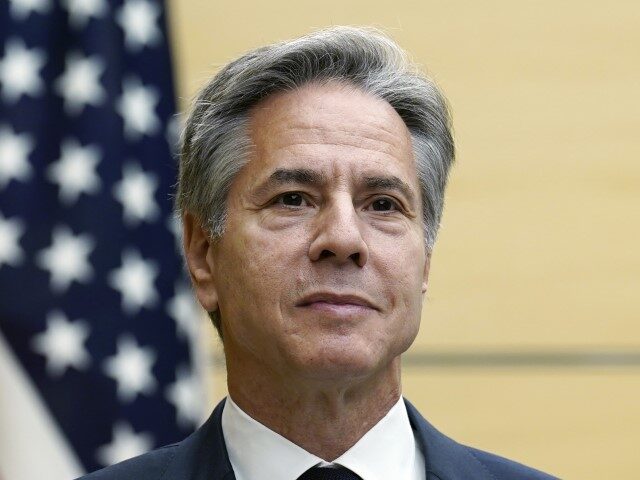Secretary of State Antony Blinken “welcomed” remarks by the Prime Minister of Iraq, Mohammed Shia al-Sudani, that his government would investigate a rocket attack last week on the United States embassy in Baghdad.
Sudani made the remarks during a phone call with Blinken on Tuesday.
Terrorists believed to be aligned with and funded by the government of Iran launched a rocket attack on Baghdad’s “Green Zone,” the fortified area where the American embassy and other critical government buildings are located, on Friday. It was the first such attack on the embassy in Baghdad since October 7, when the Sunni jihadist organization Hamas launched an unprecedented assault on Israel, killing an estimated 1,200 people, abducting around 240 others, and engaging in wanton acts of torture, gang rape, murder of children, and desecration of the dead.
Hamas is closely affiliated with Iran, the world’s preeminent state sponsor of terrorism. According to a State Department report, Hamas and another regional terrorist group, Palestinian Islamic Jihad, receive around $100 million a year from Tehran’s coffers. Other terrorist groups in Iran’s orbit – prominently Yemen’s Ansar Allah, or the Houthi movement, which has launched a campaign to interfere with international trade by attacking ships they believe are bound for Israel – Islamic Jihad, the Lebanese Hezbollah, and a collection of Iran-backed Iran groups identifying as the “Islamic Resistance in Iraq” have also engaged in activities meant to harm Israel or its top international ally, the United States.
The United States has faced at least 92 attacks in Iraq and Syria at the hand of jihadist groups sympathetic to Hamas since October 17, which injured at least 66 American service personnel, according to the Kurdish outlet Rudaw.
The attack in Baghdad’s Green Zone occurred at dawn on Friday, December 8, and consisted of a barrage of rockets targeting the embassy. Reuters reported, citing American military sources, that the attack was “the largest … of its kind in recent memory,” but no reports indicate any deaths or major damage to the embassy.
Blinken held a call with al-Sudani, the prime minister, which the State Department did not depict as contentious, nor did it suggest Blinken put pressure on Sudani to act against Iran-backed militias in the country. Iraq formally wove several of these militias – including some U.S.-designated terrorist organizations, such as Kataib Hezbollah – into its armed forces as part of the Popular Mobilization Forces (PMF) after they helped fight the Islamic State during the war against the “caliphate.”
“The Secretary condemned the attack on the U.S. Embassy in Baghdad as well as the series of attacks on U.S. personnel in Iraq and Syria in recent weeks,” State Department spokesman Matthew Miller said. “The Secretary welcomed the Prime Minister’s strong condemnation of the recent attacks as ‘acts of terrorism’ as well as the Iraqi government’s pledge to investigate and hold perpetrators accountable.”
Bliken reportedly “noted” that Iran was supporting such attacks, but Miller did not add any further elaboration. Reuters reported that, while no group took responsibility for the attack immediately, American sources suspected the “Islamic Resistance in Iraq.”
Kataib Hezbollah – an Iraqi militia under the PMF that is closely tied to Iran and a U.S.-designated terror group – appeared to encourage further attacks on the embassy on Sunday. According to Iranian propaganda outlet PressTV, senior Kataib Hezbollah official Abu Ali al-Askari called the embassy a “military command center conspiring against the Iraqi nation” and a “den of espionage,” condemning Iraqi politicians who assured their American counterparts they would protect the site.
“Shame on such politicians and their personal interests, which are seriously detrimental to the country. These individuals tend to condone the fact in order to maintain their posts,” al-Askari was quoted as saying. “The fact of the matter is that these positions will disappear once invaders are driven out.”
In addition to Blinken’s call with Sudani, Pentagon spokesman Brigadier General Pat Ryder expressed gratitude to Iraq in remarks to the Kurdish outlet Rudaw on Tuesday.
“We do very much appreciate the Iraqi Security Forces and the assistance that they have provided when it comes to addressing these threats,” Ryder was quoted as saying. “But at the end of the day, if our forces are threatened, we will not hesitate to take action to ensure that they remain safe.”
Sudani responded to the attack on Friday by calling for an investigation into the security forces tasked with protecting the embassy. Aside from that action, however, Iraq’s response to a surge in attacks on American targets in the country has been tepid. In late November, following a series of attacks against the Al-Asad Airbase and other U.S. targets in Iraq, the Iraqi government chose to condemn Washington rather than the various terrorist organizations responsible for the attacks. The Pentagon announced precision strikes against relevant targets, prompting the Iraqi government to complain of “a clear violation of sovereignty and an attempt to disrupt the stable internal security situation” – on the part of the United States, not the terrorist groups.

COMMENTS
Please let us know if you're having issues with commenting.